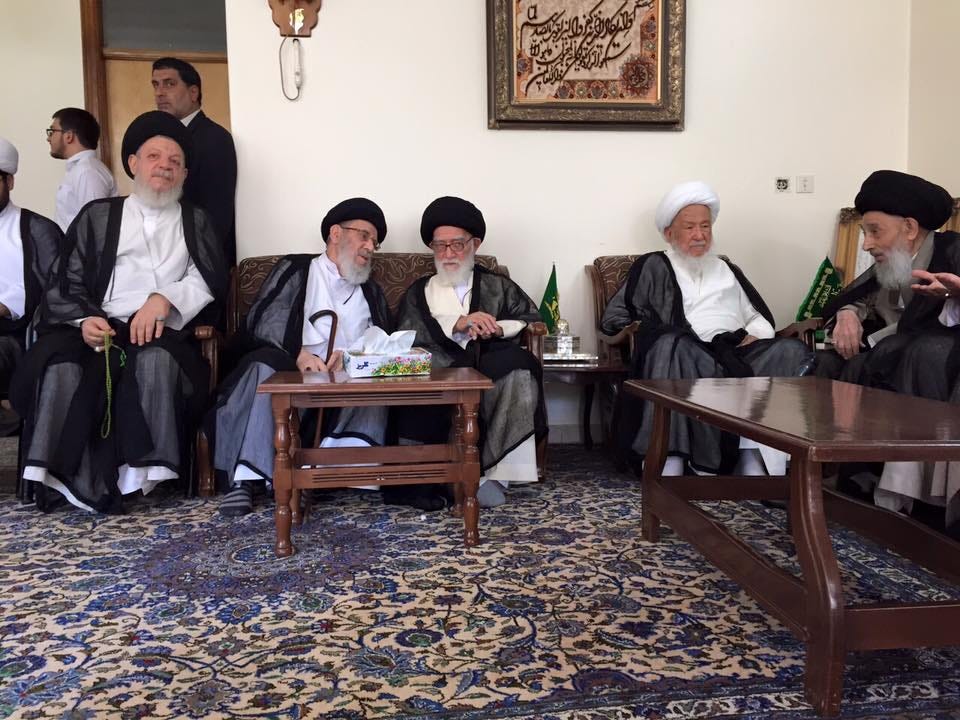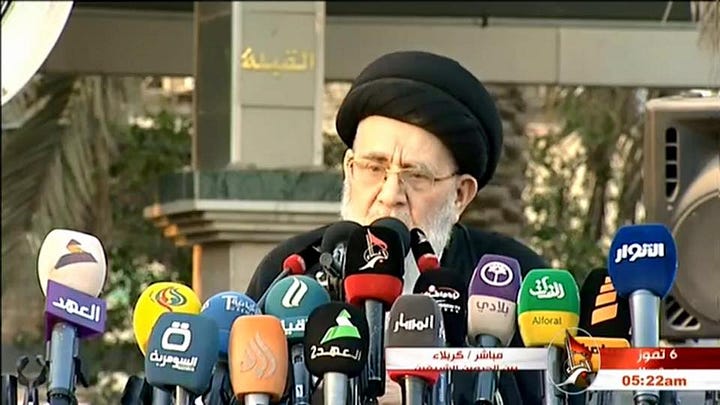
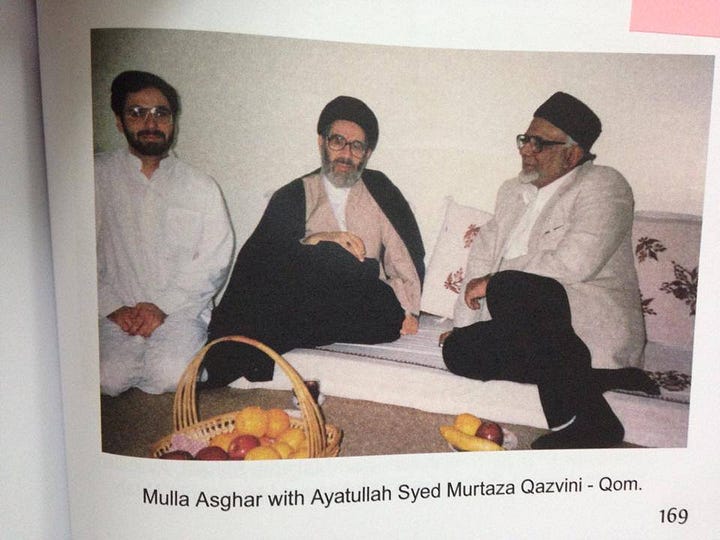
Days are getting shorter and soon, the warm evenings will be replaced by cool ones. We just celebrated the labor day, where Nixon had call for 32-hour week.
We also commemorated the nuclear bombing by USA on Hiroshima and Nagasaki with the release of the film Oppenheimer – the first blockbuster film on the topic of nuclear weapons. Detail on Peace & Justice events & issues visit https://lepoco.org/events-2/
And, this week the Shia Muslims commemorated the 40th – Chelum or Araba’een where 30 million people descendant in Karbala, Iraq. The largest gathering in the world.
If my body is not physically in Karbala right now, my heart is with the pilgrim (Zawar) visiting Imam Hussain in Karbala. Syed Sahla Qazwini.
During my visit to Karbala in May 2023, I had an opportunity to visit Dr. Sayed Jaffer Qazwini, President of Imam al-Hujjah Hospital in Karbala. I had also promised him to write about the hospital and the legacy Qazwini family.
al-Qazwini Ancestry from 1771 from Muhammad-Baqir al-Qazwini and Muhammad-Ali al-Qazwini – 240 years ago.
Qazwini have lineage of 42 generations to the Prophet Muhammed. In 1986 the exiled Iraqi family of revered Shi’i imams began to emigrate to the U.S. from Kuwait, in the footsteps of his father, Ayatollah Murtadha al-Qazwini.
The al-Qazwini family is a religious intellectual family, that followed through for generations. Its patriarch is Sayyid Muhammad-Baqir al-Qazwini, who is known as Muallim al-sultan (teacher.)
He emigrated from his hometown, to Najaf in 1771, and then to Karbala, where he settled in 1783. Muhammad-Baqir was accompanied by his brother Muhammad-Ali al-Qazwini.
The sons of Syed Ayatollah Murtadha al-Qawini are: Sayed Ali Qazwini (president of DRF-US chapter), Sayed Mostafa Al-Qazwini, (Imam of IEC-Orange County, CA), Sayed Mohammed Qazwini, (director of Orphan schools-Karbala, Iraq), Sayed Hassan Qazwini (Imam of Islamic Institute of America, Dearborn Heights, MI), Sayed Dr. Jaffar Qazwini, (CEO Imam Al-Hujjah hospital, Karbala), and, Sayed Husain Qazwini (Islamic Jurist and Scholar, Karbala Seminary.)
Who is Murtadha al-Qazwini?
For over two century al-Qazwini’s family members have preached and taught in Karbala. They lived in a home next to the Imam Hussein shrine. Ayatollah Sayyid Murtadha al-Musawi al-Qazwini (Arabic: مرتضى الموسوي القزويني; b. August 1, 1930) is a senior Iraqi Shia jurist, poet, and orator of Iranian descent.
Ayatollah Sayed Murtadha Al-Qazwini was born in one of the holiest cities in the Islamic world—Karbala, Iraq—in 1930 to a family well known in the Shia world for its knowledge, wisdom, and piety.
His father, the grand Ayatollah Sayed Sadiq Al-Qazwini was one of Iraq's most popular and educated Mujtahids. As a distinguished and respected scholar, masses of people congregated to follow him in the daily prayers he led at the shrine of Al-Abbas (as). He was abducted by the Baathist regime on April 18, 1980 at the age of eighty.
He has been missing ever since however, Amnesty International deemed him as the oldest political prisoner in the world at the time. Following the few weeks after the collapse of the regime in 2003, the family found documents verifying his death in Saddam's prisons
Murtadha al-Qazwini began his religious education at a young age. He carried out theological studies and academic education concurrently, and at the age of seventeen, was awarded by Salih Jabr, for being the highest achieving student in the country.
Ayatollah Sayed Murtadha Al-Qazwini studied jurisprudence (Fiqh and Osool) under the most renowned scholars of his time. including He completed his intermediate and final stages under Ayatollah Mirza Mahdi, Ayatollah Sheikh Jafar al-Rashti, Sheikh Muhammad al-Khatib, Sayyid Muhammad-Hassan, Al-Shirazi, Agha-Mir al-Qazwini, Sheikh Yusuf al-Khorasani, and Ayatollah Sayyid Muhammad-Hadi al-Milani.
At the age of 12 years, he studied oratory under the supervision of his maternal uncle, Sayyid Muhammad-Salih al-Qazwini, who was a renowned cleric and orator.
In his early 20's he was giving lectures at Al Hussain’s shrine and began traveling all over the Arabic-speaking world to lecture. Countries he visited included Kuwait, Bahrain, Saudi Arabia, Lebanon, Syria, Egypt, Dubai, and other surrounding countries.
He wanted to study at Al-Azhar University, and so he travelled to Cairo to enrolled into the university. However, upon looking into the syllabus, he realized that the studies were not as advanced.
He felt the standard in Karbala was of much higher caliber, which led him to abandon his studies in Al-Azhar, and return to Karbala. At the age of 23 he was granted ijaza's from Sayyid Abd al-Husain Sharaf al-Din, Sheikh Agha Bozorg al-Tehrani and al-Milani.
At the age of 30 years, he established and directed al-Kitab wal-Itra Institution for advanced religious studies in Karbala. The institution developed and trained speakers and scholars and dispatched them to all parts of Iraq and beyond.
After the 1979 Islamic revolution in Iran, he moved to Tehran and served as a professor in Shaheed Mutahhari University in Tehran. Furthermore, his eminence taught in the Hawza (seminary) in Qum for several years.
In Tehran, he led prayers at a well-known masjid named “Masjid Al-Qodos.” After six years in Iran Ayatollah Sayed Murtadha Al-Qazwini migrated to the United States in 1986.
Activism against Saddam Hussain and Exile of Qazwini family.
Ayatollah Sayed Murtadha Al-Qazwini a black turban Syed - symbolizing his family's descent from the Prophet Mohammed ferociously spoke out against Saddam Hussein. He lost many relatives to Saddam’s brutality, and in 1971 he fled Iraq to escape a death sentence.
The Baathist regime identified the entire al-Qazwini family as an ideological threat to Baathist regime. In 1980, the father Ayatollah Sayyid Muhammad-Sadiq al-Qazwini, was arrested and imprisoned by Saddam Hussein because he did not support the Baathist regime.
During the days of the communist, Abd al-Karim Qassim, and Saddam, the Sadiq al-Qazwini supported Ayatollah Sayyid Muhsin al-Hakim's fatwa deeming communism, and colonization as an infidelity - making him the first cleric to become a political prisoner in Baghdad.
Sayyid Murtadha al-Qazwini, his first cousin Sayyid Mohammed Khadim al-Qazwini and Ayatollah Mohsin Hakim’s family were among the leading scholars in engaging in Islamic activism against the regime. Twenty-seven of the Hakim family members were killed or missing.
After the Baathist regime took control in 1968, severe persecution began towards the Shias, specifically in the seminary in Najaf and Karbala. As a result, al-Qazwini could not remain in home country for too long, and had to flee Iraq.
Murtadha al-Qazwini fled to Kuwait in October, 1971 and picked up where he left off in Iraq delivering speeches, teaching jurisprudence, and writing. In 1980, he travelled to Iran after the Iranian revolution.
Al-Murtadha Qazwini’s father, uncles, and family were forced to flee from Saddam’s regime in 1971 with nothing but the clothes they wore. The grandfather, Ayatollah Mohammed Sadiq al-Qazwini, remained in Iraq criticizing the Ba’ath regime.
The 80-year-old patriarch believed his age would make him immune from Saddam’s wrath, but he was imprisoned on April 8, 1980—and never heard from again.
Al-Qazwini’s father and Ayatollah Hakims family participated in the 1920 revolt against the British occupation that was largely led by Shiites from Karbala and Najaf.
In 1971, Murtadha Al-Qazwini received tipped by the governor of Karbala that Saddam’s forces planned to arrest and execute him so, he fled Kuwait, Iran, London and finally in 1985 to USA.
After living in exile, moving from one country to another for fear of assassination, on his return for medical treatment to USA, TSA officer ask Ayatollah where did you go? The Ayatollah said, “I went home.”
TSA officer said “this is your home.” Ayatollah was in tears to hear TSA officer tell him that this was is your home, deeply touched him,” Dr. Jafar said. It pained the Ayatollah to say that US forces have to leave that once symbolized freedom.
It was here in Irvine, California that four of his nine children followed his lead and started Shiite mosques, schools, charity foundations and interfaith dialogues.
Ayatollah Murtadha al-Qazwini’s Legacy in USA.
During his exile and coming to USA, Murtadha Al-Qazwini always carried a small cake of earth (Turba) – the soil in his pocket use for prostration and a reminder of his heritage and the martyrdom of Imam Hussein, whom Shiites revere.
In 1985, he emigrated to the United States, and settled in Los Angeles where he built Shiite religious and educational centers in Pomona, Irvine, San Diego, and Detroit over the next two decades.
He established As-Sadiq Foundation in Fresno, City of Knowledge School in Pomona, Masjid al-Zahra in Southgate, Imam Ali Islamic Center in San Diego, and Islamic education Center of Orange County where he and his son’s led prayers and offered lectures and religious programs.
When Ayatollah Qazwini Became A Janitor For Imam Hussain – A must see video.
Literacy Works of Murtadha al-Qazwini.
Ayatollah Sayed Murtadha Al-Qazwini has written a variety of books that are directed towards the Muslim youth, whom he spent much of his life educating and cultivating.
He has several unpublished books: a book that combines all of his poems in regards to Allah, Mohammad, and his holy progeny, a book in which he gathered most of his beautiful and spiritual memories, and a book about the stages of the Day of judgment
Murtadha al-Qazwini has written numerous books including: al-Nubuwa wal-Anbiya' Fi Nathar Ahl al-Bayt (Prophethood and Prophets in the perspective of the Ahl al-Bayt), al-Mahdi al-Muntathar (The Awaited Mehdi), A'lam al-Shia (Notables of the Shia.)
He has written three volumes on al-Alamah al-Hilli, al-Tusi, Baha al-Din al-Ameli. Murtadha al-Qazwini has written many verses of poetry, mostly in memory of the Ahl al-Bayt, either in praise or mourning. His most famous poem is about Husain ibn Ali.
Homecoming of Ayatollah to Karbala, Iraq.
“The first time I saw the dome of Imam Hussein’s shrine, I could not control myself,” he said, his voice cracking and eyes filling with tears. “I began to talk to him: ‘Oh, Imam Hussein, I am your son. I have come from far away to guide my people and country. Please help me.’ ”
Anxious to find out what had happened to relatives during his 32-year exile, Ayatollah Murtadha flew to Baghdad in 2003 just five days after U.S. troops rolled into Iraq.
Word soon spread that the Ayatollah had returned home. Crowds surrounded him, pulling at his clothes, kissing his forehead, demanding, and pleading for speeches and sermons. On Friday (Juma’ah) he addressed thousands inside the Shrine of Imam Hussein.
The people, he said, were hungry for spiritual guidance and teachings which had been severely oppressed under Saddam Hussein. He delivered his teachings twice daily- after noon and sunset prayers -- at the shrine.
On returned to Iraq with an emotional homecoming, however after one year he said:
“U.S. forces have worn out their welcome by failing to fulfill their promises for democracy, political empowerment, and reconstruction… He wants them to leave Iraq as soon as possible.”
Shi’i romance with Americans came to an end when in late March 2004, when Coalition Provisional Authority leader Paul Bremer imposed an American constitution on Iraqis and finally, al-Sistani intervened to end the interference by American.
In 2006 at the time of Samara bombing I visited Karbala, though Ayatollah’s speech was in Arabic, my guide summed up saying American have to leave they are the cause of violence and destruction
When I visited Karbala in 2006, there was little electricity, no sanitation, no security, no jobs, no health care, poverty widespread—even the water was polluted. The only thing Iraqis had was lawlessness.
We eighteen pilgrims (group with Sister Razia Dharani) were at Syed Amar Hakims residence for lunch where we could hear the bombing in the neighborhood.
Pilgrimage to Iraq (2006) ends with a visit to Ali al-Sistani.
https://www.mcall.com/2006/05/01/pilgrimage-to-iraq-ends-with-visit-to-ali-al-sistani/
Ayatollah Murtadha Al-Qazwini was still awed by the liberation of his homeland. He was tearful, so emotional to set foot again on the sacred soil of Karbala, a southern Iraqi city of more than 1 million people that is home to the holy shrine of Imam Hussein and his brother Hazarat Abbas.
Due to the request of the citizens of the holy city of Karbala Ayatollah Al-Qazwini became the Imam of the daily prayers at the shrine of Imam Hussein in Karbala.
Along with leading the prayers, he conducts daily sermons and devoted his time to educating and guiding the Iraqi population, filling the void of Islamic knowledge that came about during the dictatorship of the corrupt regime of Saddam.
After twenty-three years of exile between Kuwait, Iran, and the United States, he immediately founded Imam al-Sadiq School, a state-of-the-art full-time Islamic school in Karbala.
It was evident that the Baathist regime had oppressed the Shias in Iraq, with Karbala in the forefront, having no schools, hospitals, or orphan homes. And According to UNICEF, there were five million orphans in Iraq after the invasion so, In 2004, al-Qazwini family founded the Development and Relief Foundation (DRF).
Ayatollah al-Qazwini embarked on a mission to revive Karbala. The DRF has established a school, orphanage, Islamic Seminary, hospital, clinics, roads, and numerous development projects.
According to Al-Qazwini’s son, Jaffer, the family established an orphanage, schools, and university aimed at giving Shiites the higher education they had often been denied during Hussein’s regime.
Ayatollah had dreamed of bigger ventures. The most urgent was a hospital for the city. He said “This is what brings people to religion -- not just lectures and sermons…serving their basic needs that they become more compassionate in return.”
In 2008, he sponsored and lead the efforts of constructing the Imam Al-Hujjah Hospital, a first of its kind charitable hospital in the region, that is solely founded on donations of philanthropists at large.
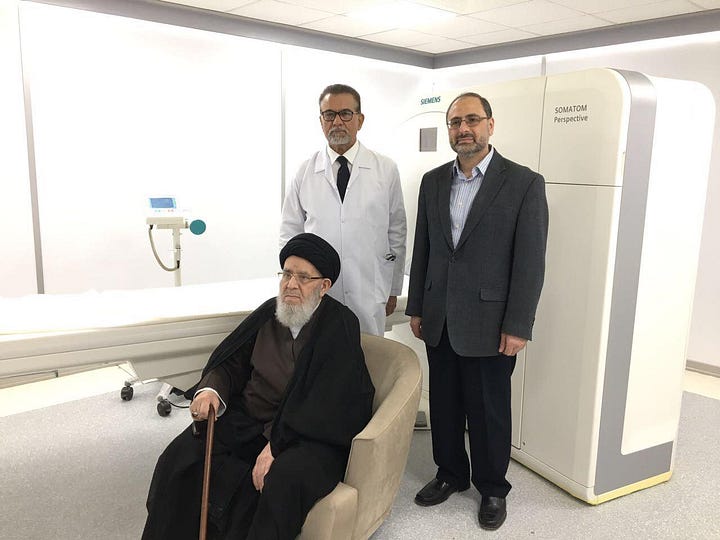
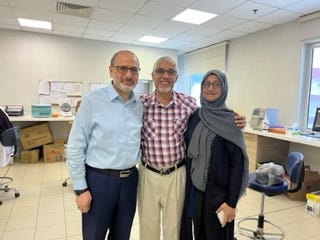
To learn more about Karbala Hospital, visit its website at
https://drfcharity.org/project/karbala-hospital/
Any philanthropic foundation, organization, pharmaceuticals, hospital or individual willing to make donation in medical equipment or products, medications or money please contact Dr. Jaffar Qazwini directly at +9647714767385 or info@drfcharity.org or info@karbalahospital.org
This well renown hospital with high tech equipment’s and perform high class surgeries. It has gained interest and recognition of several healthcare institutes in North America, among which are the Institute of International Health at Michigan State University and Hardin Memorial Hospital in Louisville.
Death of Ayatollah Baqir al-Hakim SCIRI leader & pro-Israel neocon agenda.
When someone knocks down a house or invades the country with “Shock and Awe” bombing than it should rebuild it for the destitute occupants but all USA did was steal oil and proliferated corruption during its occupation.
The Al-Qazwini like Al Sistani supports a middle course between theocracy (Vilayet-e-Faqih) and the U.S. model of separation of church and state. He believes that religious scholars should not hold office but should offer guidance to policymakers.
This is the beauty of Ijtihad – difference of opinion to follow the Islam (legal reasoning and hermeneutics), however the Zionist media portrayed it as the division between the Ayatollahs and created mayhem between the Shi’ites. .
The first Bush administration did not want to touch the Shia. They were afraid the Shia would take over in Iraq" with an Iranian-style theocracy. It remains unclear which legacy will have the most lasting imprint in the new Iraq - that of Abraham Lincoln or that of the turbaned clerics in Tehran.
Paul Wolfowitz eulogized Baqir al-Hakim (Martyred Aug 29th, 2003) as an Iraqi Abraham Lincoln. The deputy defense secretary hailed Ayatollah Baqir al-Hakim as a "true Iraqi patriot," He quoted from the Gettysburg Address as the likened slain leader to the Union soldiers who had died to preserve their country.
It was a eulogy that al-Hakim undoubtedly would have found jarring but, the assassination of the martyred Muhammad Baqir al-Hakim leaves many unanswered questions on who was responsible?
Jeanine Hennis-Plasschaert (UNAMI), Special Representative of the UN Secretary-General for Iraq said “Ayatollah Muhammad Baqir al-Hakim was a true leader for many, a leader who dedicated his life to promoting unity, justice, and equality in Iraq.”
Imam Sayyid Ali Khamenei, Leader of Islamic Iran, described Baqir al-Hakim as a "mujahid alim who spent years fighting the Saddam regime" and "a bastion of resistance against the occupiers."
Many observers have also pointed out that the scale and efficiency of the attack suggests state involvement with a long record of political assassinations. The return of Baqir al-Hakim to Najaf was describe by an CIA operative as “millions are out welcoming him like the waves in the ocean and we are seeing another Khomeini”
Ayatollah Murtadha al-Qazwini did not want to align himself with any foreign governments – Iran or America. Before the invasion of Iraq, Bush had called a meeting of the Shia leaders with Dr. Aziz Sachedina to Pentagon for a pre-war round of meetings. Awaiting the transcript of that meeting!
Many Shia leaders in California and Michigan were uncomfortable with American goals in the region, and they saw American policy as hostile, rightly, or wrongly, to any Islamic state on behalf of Zionist Israel but they were willing to cooperate in furthering the greater goal of removing Saddam.
Al-Qazwini family have met many US president from Clinton, Bush to Biden to discuss issues pertaining to Muslim affairs. The State Department and Defense Department have also invited Al-Qazwini family for Eid and Iftar dinner as an influential Muslim Shi’a religious leaders in the United States.
Qazwini family have appeared on CNN, NPR, BBC, VOA, the New York Times, the Detroit News, the Detroit Free Press, and a wide range of many other media outlets.
On my recent visit to Iraq, and meeting Dr. Jaffar Qazwini I heard ordinary people voice nostalgia for Saddam’s rule as the Golden Era - They do not mean it—there was no freedom under Saddam it was brutal oppression, but there was stability, work, health care, universal education, and no sectarian massacres.



